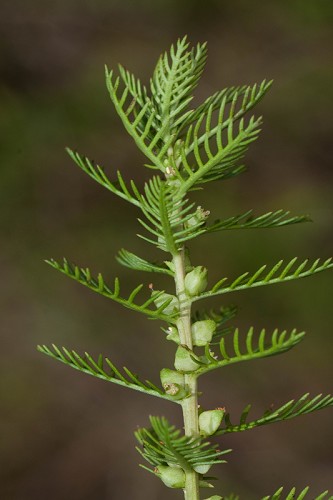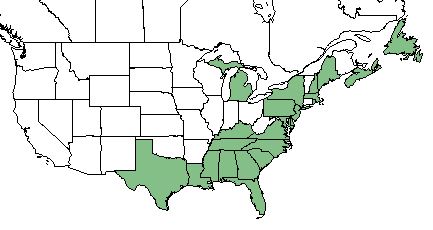Proserpinaca pectinata
| Proserpinaca pectinata | |
|---|---|

| |
| Photo by John Gwaltney hosted at Southeastern Flora.com | |
| Scientific classification | |
| Kingdom: | Plantae |
| Division: | Magnoliophyta - Flowering plants |
| Class: | Magnoliopsida - Dicots |
| Order: | Haloragales |
| Family: | Haloragaceae |
| Genus: | Proserpinaca |
| Species: | P. pectinata |
| Binomial name | |
| Proserpinaca pectinata Lam. | |

| |
| Natural range of Proserpinaca pectinata from USDA NRCS Plants Database. | |
Common Names: feathery mermaid-weed;[1] combleaf mermaidweed[2]
Contents
Taxonomic Notes
Synonyms: none
Description
Proserpinaca pectinata is a dioecious perennial that grows as a forb/herb.[2] Flowers are red, orange, and green in color.[3]
Distribution
This species occurs from Nova Scotia, south to southern Florida, and westward to western Louisiana. While it is primarily found along the coastal plain, it occurs inland, as far as Tennessee.[1]
Ecology
Habitat
P. pectinata occurs in bogs, savannas, ditches, and other wet places.[1] Along New York pond shorelines, this species is found on areas of organic exposed pond bottoms and permanently flooded zones.[4] In New Jersey pinelands, Proserpinaca pectinata occurred in 20% of ponds.[5]
Proserpinaca pectinata is an indicator species for the Calcareous Savannas community type as described in Carr et al. (2010).[6]
Phenology
In the southeastern and mid-Atlantic United States, flowering has been observed from June through October.[1][7]
Conservation and Management
Cultivation and restoration
Photo Gallery
References and notes
- ↑ 1.0 1.1 1.2 1.3 Weakley AS (2015) Flora of the Southern and Mid-Atlantic States. Chapel Hill, NC: University of North Carolina Herbarium.
- ↑ 2.0 2.1 USDA NRCS (2016) The PLANTS Database (http://plants.usda.gov, 31 January 2018). National Plant Data Team, Greensboro, NC 27401-4901 USA.
- ↑ Plant database: Proserpinaca pectinata. (31 January 2018) Lady Bird Johnson Wildflower Center. URL: https://www.wildflower.org/plants/result.php?id_plant=PRPE
- ↑ Zaremba RE, Lamont EE (1993) The status of the coastal plain pondshore community in New York. Bulletin of the Torrey Botanical Club 120(2):180-187.
- ↑ Laidig KJ (2012) Simulating the effect of groundwater withdrawals on intermittent-pond vegetation communities. Ecohydrology 5:841-852.
- ↑ Carr, S.C., K.M. Robertson, and R.K. Peet. 2010. A vegetation classification of fire-dependent pinelands of Florida. Castanea 75:153-189.
- ↑ Nelson, G. PanFlora: Plant data for the eastern United States with emphasis on the Southeastern Coastal Plains, Florida, and the Florida Panhandle. www.gilnelson.com/PanFlora/ Accessed: 31 JAN 2018